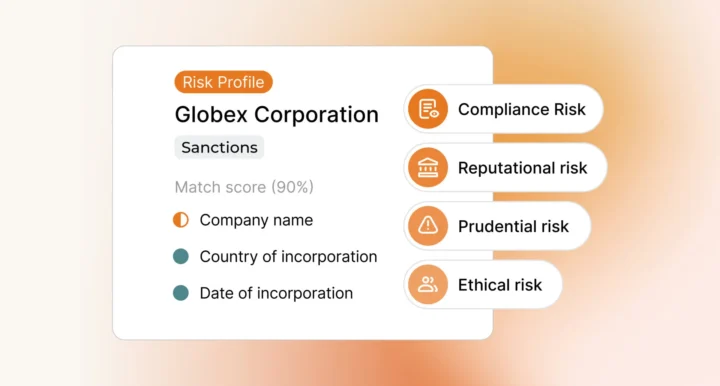While Belgium has a reputation as a wealthy and politically influential European power, it also faces an increasing number of financial crime threats, which include international money laundering and terrorism financing activities. In 2021, for example, Belgium’s financial intelligence unit (FIU) recorded 46,000 suspicious transactions, up 50% on the previous year. In order to protect its own economic system from that threat, and contribute to global anti-money laundering (AML) and counter-financing of terrorism (CFT) efforts, Belgium has built a robust regulatory framework for financial institutions, and established a financial regulator to oversee compliance.
If you’re setting up or doing business in Belgium, it’s important to understand how Belgium’s AML regulations will affect you, and what steps you need to take to protect your organisation from risk.
Belgium AML Regulators
The Financial Services and Markets Authority
Belgium’s primary financial regulator is the Financial Services and Markets Authority (FSMA). Established in 2011, the FSMA replaced its predecessor, the Banking Finance and Insurance Commission (CBFA), as part of an effort to consolidate supervision of Belgium’s financial system, and protect the transparency, fairness, and orderly operation of its markets. To that end, the FSMA works primarily in the following domains:
- Supervision of financial products and services, including pension schemes
- Compliance with financial conduct rules and AML/CFT regulations
- Surveillance of markets and distributed financial information
- Financial education
The FSMA works with the National Bank of Belgium (NBB) and the Federal Public Service Economy in its supervisory role, and has the authority to conduct onsite inspections or request documentation in order to verify AML/CFT compliance. Where it finds violations, the FSMA may issue warnings, impose business prohibitions, or impose sanctions including significant financial penalties against the offending firms.
As a member of the European Securities and Markets Authority (ESMA) and other international financial organisations, the FSMA also represents Belgium on the global financial stage. To that end, it is signatory to numerous international financial crime agreements and coordinates with counterpart organisations to protect global financial markets.
The CTIF
Following Financial Action Task Force (FATF) and EU directives, Belgium has also established a financial intelligence unit (FIU), known as the Financial Intelligence Processing Unit (CTIF). Like other FIUs, the CTIF is an independent, autonomous entity responsible for collecting and processing AML/CFT data, including suspicious transaction reports (STR), in order to provide actionable intelligence for subsequent law enforcement investigations. The CTIF also coordinates with counterpart FIUs in other countries to aid in the investigation and prosecution of financial crime.
Key AML Regulations in Belgium
Belgium’s main AML/CFT legislation is the Law of 18 September 2017 on the Prevention of Money Laundering and Terrorist Financing – also known as the “AML Law”. The law transposes the details of the EU’s Anti-Money Laundering Directives, establishing a set of risk-based AML/CFT requirements for firms that operate within Belgium’s jurisdiction.
As new AMLDs are released, the Belgian government updates the AML Law to include the latest regulatory detail. The Sixth Anti-Money Laundering Directive, for example, sets out a harmonised list of money laundering predicate offences, and expanded the definition of money laundering to include aiding and abetting.
Belgian authorities may impose fines for non-compliance with the AML Law, which may reach up to €1,250,000 for non-financial companies, and €5000 or 10% of annual turnover (whichever is greater) for financial companies.
How to Comply with Belgium’s AML Law
The AML Law imposes risk-based AML/CFT requirements on firms operating within Belgium. This means that firms must conduct a risk assessment of individual customers to establish the level of risk they present, and then deploy proportionate AML/CFT compliance measures.
Establishing risk accurately is a significant challenge for financial institutions, which must collect and analyse large amounts of data in order to establish accurate customer risk profiles. With that in mind, Belgian AML/CFT compliance solutions typically include the following controls:
- Customer due diligence (CDD) measures to establish and verify the identity of customers, and build accurate risk profiles. Required CDD information may include names, addresses, places of business, and other identifying materials.
- Ultimate beneficial ownership (UBO) verification of corporate structures in order to ensure that money launderers are not concealing their identity with shell companies or corporate structures.
- Customer screening against relevant watchlists, including politically exposed person (PEP) lists and global sanctions lists, and adverse media sources. PEPs and persons subject to sanctions represent a high financial crime risk, so firms must perform ongoing screening to verify any changes to customer statuses.
Adverse media screening: In an evolving financial landscape, one of the quickest ways to establish true customer risk is to conduct adverse media screening – which may reveal critical compliance information before confirmation by official government sources. Adverse media includes news stories, social media, blogs, and forum posts, and may detail involvement in criminal activity, incoming regulatory changes, or a customer’s designation on watchlists and sanctions lists – all of which will likely change a customer’s risk profile.
Sanctions screening: Customers that are subject to international sanctions pose an elevated AML/CFT risk, and should be subject to enhanced due diligence (EDD) including adverse media scrutiny. As an EU member-state, Belgium must comply with EU sanctions screening requirements: in particular, firms should pay close attention to Russia sanctions, which are updated frequently, and currently designate a range of companies and individuals that directly support or are involved with the invasion of Ukraine.
Belgium AML Initiatives: Crypto Regulation
In addition to the most recent AMLD measures, Belgium will, like other EU member states, implement the Markets in Crypto Assets (MiCA) regulation. Scheduled to be introduced in 2024, MiCA will affect the AML/CFT treatment of crypto assets, introduce specific requirements for the use of stablecoins, and establish an EU-wide crypto asset service provider register overseen by the European Banking Authority.
Belgium has focused heavily on crypto regulation recently, with an amendment to the AML Law in 2022, which brought crypto service providers under the scope of the legislation (and previous EU AMLDs). The amendment introduced the following measures:
- A definition of “exchange services between virtual currencies and fiat currencies” as they pertain to the AML Law.
- A definition of the type of crypto exchange services that fall under the scope of the AML Law.
- A prohibition on non-European Economic Area persons offering or providing crypto exchange services in Belgium.
- An FSMA registry of crypto exchange service providers.
- A number of new criminal offences and sanctions that pertain to crypto asset activities.
The amendment came into effect on 1 May 2022.
AML Compliance Solutions
EU AMLDs include strict requirements for both sanctions and adverse media screening compliance, and firms in Belgium must be prepared to search international data sources for customer involvement in risk factors set out in domestic legislation. Speed, scope, and accuracy are critical to effective customer screening, which means firms must seek a solution with a global scope, that can be tailored to their risk appetite, and that can minimise false positive alerts.
Ripjar’s Labyrinth Screening platform is built to achieve screening compliance in Belgium, the EU, and jurisdictions around the world. Built with cutting-edge machine learning technology, Labyrinth Screening is informed by thousands of global data sources in real time, including the latest adverse media, sanctions list and watchlist updates. Labyrinth is capable of searching in over 20 foreign languages to ensure firms capture data from every corner of the world, and delivers actionable intelligence in seconds so that firms can make important decisions quickly and confidently.
Contact us to discuss how Ripjar can support your AML compliance in Belgium
Last updated: 31 January 2025





